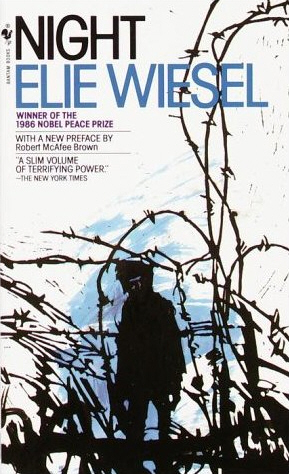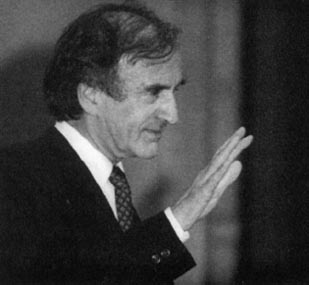Contents
1 Early life
2 World War II
3 After the war
4 Life in the United States
5 Recent
5.1 2007 attack on Wiesel
6 Controversy over historical and religious rights to Jerusalem
7 Works
8 See also
9 Notes
10 References
11 External links
Early life
The house where Wiesel was born
Wiesel was born in Sighet,, (now Sighetu Marmaţiei), Maramureş, Kingdom of Romania, in the Carpathian Mountains. His mother, Sarah Feig, was the daughter of Dodye Feig, a celebrated Vizhnitz Hasid and farmer from a nearby village. He was active and trusted within the community, and in the early years of his life had spent a few months in jail for having helped Polish Jews who escaped and were hungry. It was his father, Shlomo, who instilled a strong sense of humanism in his son, encouraging him to learn Hebrew and to read literature, whereas his mother encouraged him to study the Torah. Wiesel has said his father represented reason, and his mother Sarah promoted faith (Fine 1982:4). In his home, his family spoke Yiddish most of the time, but also German, Hungarian and Romanian. Wiesel had three sisters – older sisters Hilda and Beatrice, and younger sister Tzipora. Beatrice and Hilda survived the war and were reunited with Wiesel at a French orphanage. They eventually emigrated to North America, with Beatrice moving to Montréal, Canada. Tzipora, Shlomo and Sarah did not survive the war.
World War II
Buchenwald, 1945. Wiesel is on the second row from the bottom, seventh from the left.
In 1940 Romania lost the town of Sighet following the Second Vienna Award. In 1944, Wiesel, his family and the rest of the town were placed in one of the two ghettos in Sighet. Wiesel and his family lived in the larger of the two, on Serpent Street. On May 16, 1944, the Hungarian authorities allowed the German army to deport the Jewish community in Sighet to Auschwitz Birkenau. While at Auschwitz, his inmate number, "A-7713", was tattooed onto his left arm. Wiesel was separated from his mother and sisters Hilda, Bea, and Tzipora. Wiesel's mother and sister Tzipora were, it is presumed, killed in the gas chambers upon arrival. Wiesel and his father were sent to the attached work camp Buna, a subcamp of Auschwitz III Monowitz. He managed to remain with his father for over eight months as they were forced to work under appalling conditions and shuffled between three concentration camps in the closing days of the war. On January 29, 1945, just a few weeks after the two were marched to Buchenwald, Wiesel's father was beaten by a Nazi as he was suffering from dysentery, starvation, and exhaustion. He was later sent to the crematorium, only months before the camp was liberated by the U. S. Third Army on April 11.
 elie wiesel
elie wiesel elie wiesel
elie wiesel elie wiesel
elie wiesel elie wiesel
elie wiesel elie wiesel
elie wiesel elie wiesel
elie wiesel elie wiesel
elie wiesel elie wiesel
elie wiesel elie wiesel
elie wiesel elie wiesel
elie wiesel elie wiesel
elie wiesel




No comments:
Post a Comment